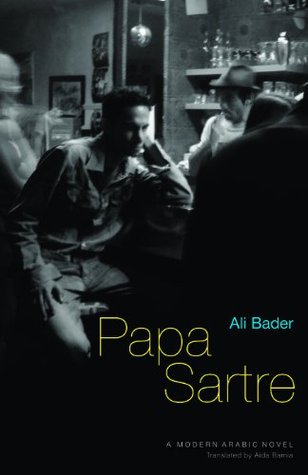"Papa Sartre" by Ali Bader
 A short but very interesting novel about a fictional Iraqi philosopher named Abd al-Rahman, a self-styled bohemian and devoted follower of Jean-Paul Sartre. Abd al-Rahman returns to Baghdad from his studies in Paris with the intention of launching an existential movement in Iraq akin to that of his hero; and being that he resembles his favorite philosopher in physical appearance (with the exception of Sartre’s ‘lazy eye’) he’s convinced that the task is up to him.
A short but very interesting novel about a fictional Iraqi philosopher named Abd al-Rahman, a self-styled bohemian and devoted follower of Jean-Paul Sartre. Abd al-Rahman returns to Baghdad from his studies in Paris with the intention of launching an existential movement in Iraq akin to that of his hero; and being that he resembles his favorite philosopher in physical appearance (with the exception of Sartre’s ‘lazy eye’) he’s convinced that the task is up to him.
The novel is framed by an unnamed narrator who is commissioned to write Abd al-Rahman’s story by his close circle of friends. However, there isn’t much information to go on and Abd al-Rahman’s death is shrouded in mystery. Was it suicide, or was it an act of murder? The narrator sets about collecting as much information as he can about the elusive philosopher and what he learns, we learn, and it’s a very intriguing peek into the intellectual and artistic world of Baghdad in the late 1960s as well as into Abd al-Rahman’s dalliances with various different women (including prostitutes) and his bohemian circle. The more we learn about him the less clear it is about his ultimate fate. There is something of a twist which takes place regarding the narrator’s benefactors, one which only furthers the satirical approach to the novel.
There are a lot of references to late 1960s Baghdad that the general reader may not pick up on and those with a more in-depth knowledge of the time and place may get a lot more out of this book. There were times where I had to look up certain names to see whether or not they were fictional or were real people being used in a fictional setting, however, one doesn’t necessarily need this knowledge to enjoy this story. The glimpse into Baghdad which will seem utterly alien to many of today’s readers, especially when you consider recent history, is enough to keep the reader curious and intrigued. It is a window into a world long since gone and an interesting peek into Baghdad’s once flourishing intellectual world. It is a highly satirical look into those who seem to need guidance in order to find meaning in their lives — whether philosophical or religious — and how that meaning will ultimately be fleeting.
 2
2



